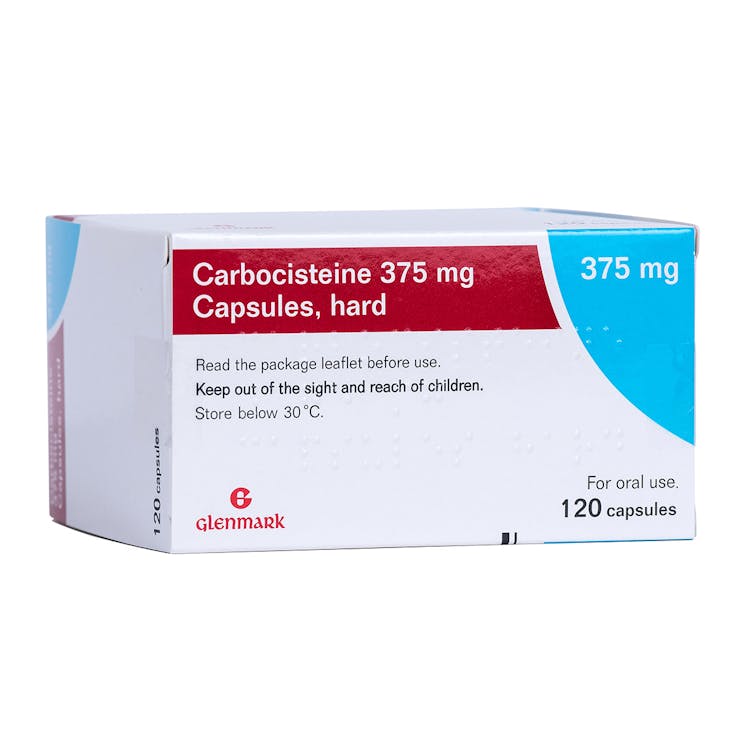- Home
- Chronic Conditions
- Asthma/COPD Treatment
- Carbocisteine
Carbocisteine
Images à titre indicatif uniquement
Carbocisteine belongs to a group of medications called mucolytics. This means that it helps you to clear mucus (sputum or phlegm) from the lungs, making it easier to breathe. It is available as a capsule or liquid.
- Effective treatment for mucus on the lungs
- Makes mucus less sticky
- Makes it easier to cough mucus up
- Genuine medication
- Shipped from EU Pharmacies
Plus d'informations
About Carbocisteine
- Carbocisteine makes the mucus in the lungs less sticky and therefore easier to cough up
- Carbocisteine is often used by patients who want to clear mucus or make their breathing feel easier, particularly those with COPD (chronic obstructive pulmonary disease)
- Carbocisteine is prescribed for coughs that are associated with thick, sticky mucus that is difficult to clear
- Carbocisteine is sometimes known by its brand name Mucodyne
- It is important to read the patient leaflet for a full list of side effects and cautions.
How Does Carbocisteine Work?
Carbocisteine changes the balance of the components within sputum or phlegm to make it thinner, less sticky, and easier to cough up.
In chronic airways diseases, including chronic obstructive pulmonary disease (COPD), thick mucus can settle within the lungs and can be very difficult to clear. Sputum that sits in the airways becomes a breeding ground for bacteria, increasing the risk of chest infections.
By making the mucus easier to cough up, carbocisteine helps to reduce the risk of airways infections. Carbocisteine needs to be taken regularly to avoid worsening , or exacerbations, of COPD.
How is Carbocisteine Taken?
Carbocisteine capsules should be swallowed with some water.
The oral liquid can be prescribed for those who find it difficult to swallow capsules.
Carbocisteine can be taken with or without food.
Dosage of Carbocisteine
The usual dose of carbocisteine is two 375mg capsules taken three times a day. This dose is then reduced to one 375mg capsule four times a day once symptoms have started to improve.
If you take the liquid, the usual dose is 750mg (15ml) three times a day, reducing to 500mg (10ml) three times a day once symptoms improve.
Taking carbocisteine at the same time every day can help you remember to take it.
Are there any Side Effects?
Like all medications, carbocisteine can have some side effects. Side effects are rare, affecting less than 1 in 1000 people who take carbocisteine, but include:
- Bleeding from the stomach or gastrointestinal tract
- Skin rash or skin blistering.
If you experience either of these side effects you must stop carbocisteine and speak to a doctor straight away.
If you have a severe allergic reaction (anaphylaxis) including breathlessness, lip or tongue swelling, call 999 immediately.
Carbocisteine Warnings
Carbocisteine may not be suitable for everyone. You should tell your doctor if you:
- Have ever had a stomach or intestinal ulcer, or any other cause of gastrointestinal bleeding
- Have ever had an allergic reaction to carbocisteine or any other medication
- Are pregnant, trying to conceive, or breastfeeding.
Because carbocisteine may not suit everyone, we will complete a Consultation with you including a health questionnaire. This will ensure that the medication will be suitable for you.
A qualified prescriber will review your current medications, including any herbal remedies or supplements, to ensure that carbocisteine will not interact with them.
Once prescribed, carbocisteine will be ordered on your behalf via electronic prescription, allowing you to pick the medication up at your convenience.
Buy Carbocisteine
Buying Carbocisteine Online
Can I buy Carbocisteine online?
You can safely buy Carbocisteine online at EU Meds. You will first need to have an online consultation with a pharmacist independent prescriber before your order will be supplied. The online consultation will ensure that Carbocisteine is the right medication for your medical condition.
Do I need a prescription for Carbocisteine?
Yes, in order to purchase Carbocisteine you will need a valid prescription. Please note, all requests for supply of prescription medications are subject to an online clinical consultation and the decision to prescribe will be made by a doctor.

Ici pour vous aider
Our Customer Service is available Monday to Friday 9am - 4pm. If you need urgent assistance, do not use this service. Call 111, or in an emergency call 999. Visit our help section



